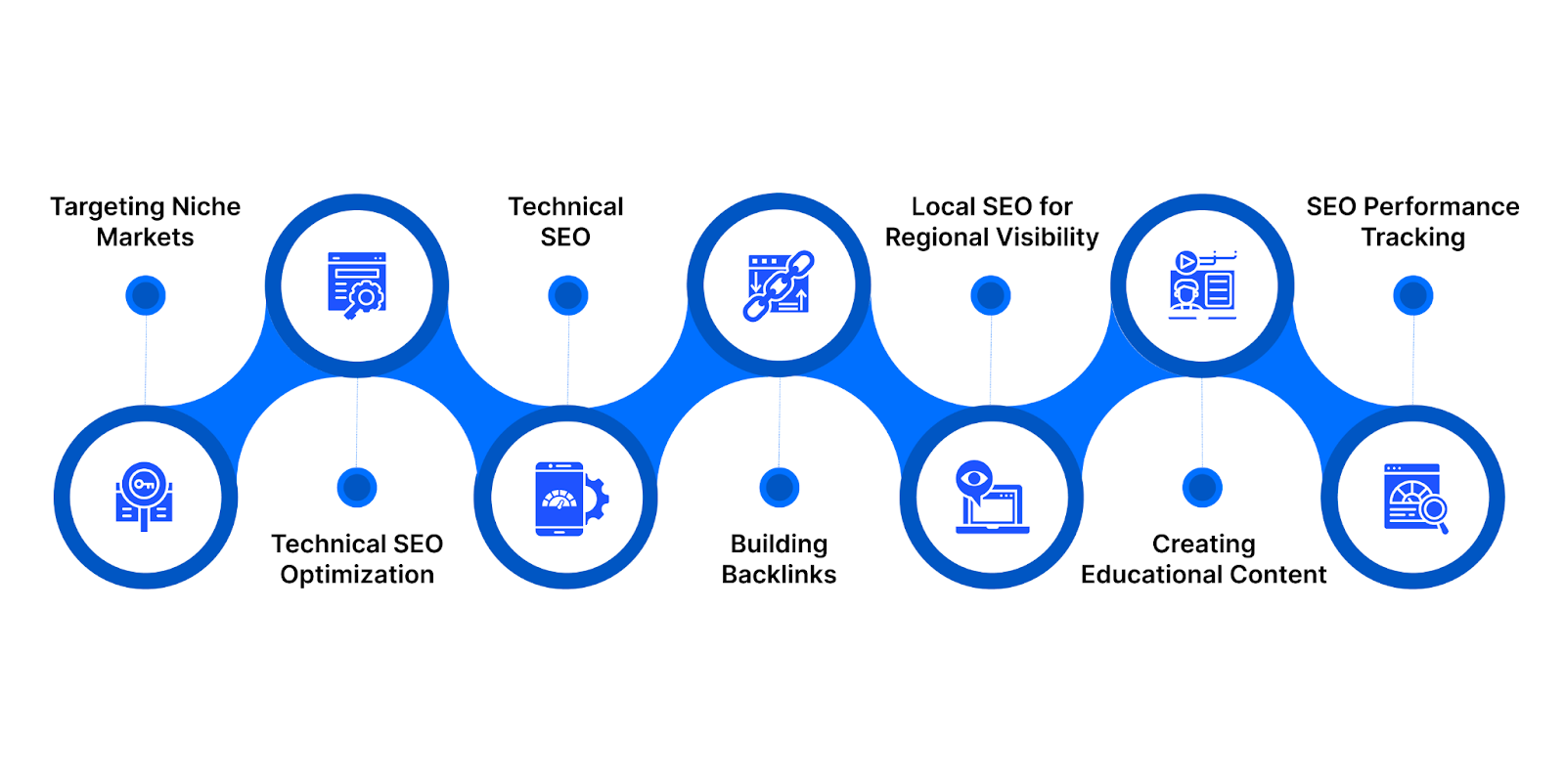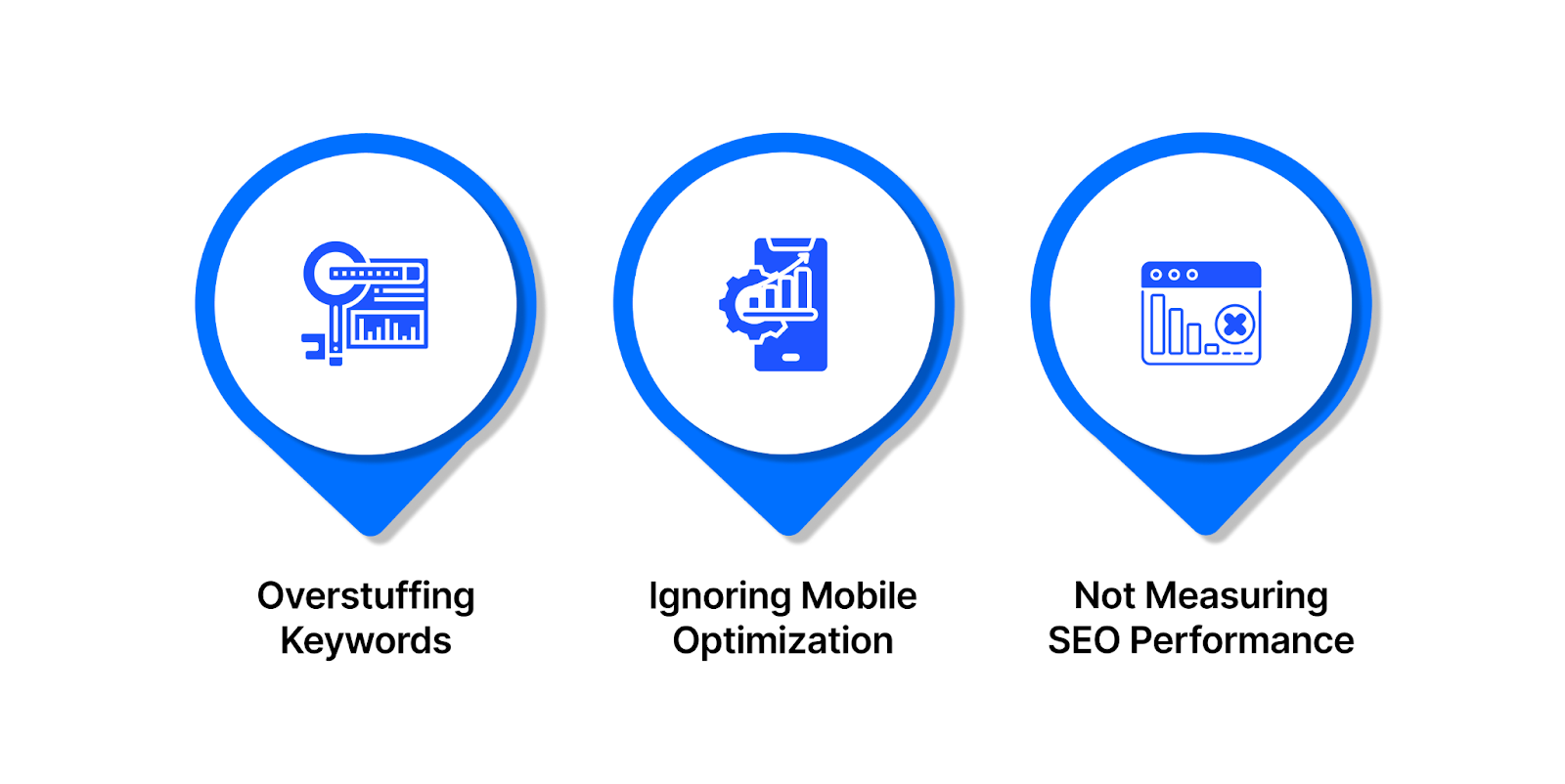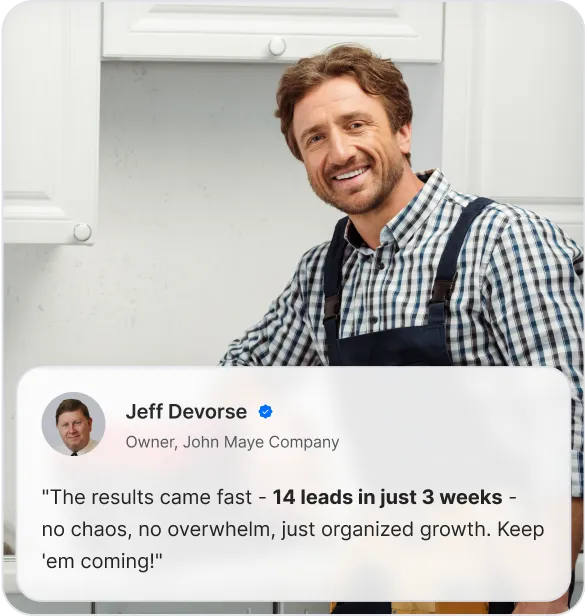When a buyer types a CAS number or a grade name into Google, what do they find on your site?
Chemical buyers search with intent. They look for exact grades, safety data, regulatory details, and proven processing capabilities. But here’s the part many manufacturers overlook. Even if you offer the right solutions, buyers won’t find you if your website doesn’t match the terms they search or clearly answer the questions they care about.
This gap is where most chemical manufacturers lose opportunities. Not because of weak products, but because their site doesn’t communicate expertise in a way search engines understand.
In this blog, we’ll walk through the best SEO practices for chemical manufacturers, examine key trends to watch, and highlight common mistakes to avoid.
Why SEO Is Crucial for Chemical Manufacturing Businesses?
SEO for chemical companies isn’t the same as SEO for other industries. Search engines need information that’s organized, documented, and structured enough to match complex terminology. Buyers expect the same.
This means your website must do things most chemical companies overlook. Product pages need more than descriptions. They need a system. Every product should follow a consistent layout with clear grade identifiers, concise application notes, and accessible SDS and TDS files. The site should use predictable URLs, clean headings, and metadata that reflect the technical nature of your catalog.
Good SEO in this industry is less about volume and more about precision. When your site follows a structured, technical format, it becomes easier for search engines to understand your data and easier for buyers to verify your capabilities.
This is the real foundation of SEO for chemical manufacturers. Not search behavior, but the technical build of your website itself.
Now that we’ve established why SEO is so important, let's explore the core SEO strategies chemical manufacturers can adopt to drive success.
7 Ways Chemical Manufacturers Can Improve SEO

For SEO to work effectively, a strategic approach is needed.
Here are seven proven SEO practices for chemical manufacturing companies looking to boost their online presence:
1. Comprehensive Keyword Research
Keyword research is the bedrock of any SEO strategy. Chemical manufacturing companies operate in specialized markets, and your keywords must reflect this specificity.
Broad terms like “chemical products” will attract a lot of traffic but might not be as useful. Instead, focus on long-tail keywords, such as “sustainable chemical solutions for the automotive industry” or “high-purity pharmaceutical chemicals.”
Tools like Google Keyword Planner help identify keywords with high search volume and relevance to your niche. By targeting specific search terms that align with your product offerings, you can attract highly qualified leads who are more likely to convert.
Avoid going too broad with your keywords. Find highly targeted terms that reflect the unique products or services your business provides.
2. On-Page SEO Optimization
On-page SEO focuses on optimizing individual web pages to rank higher and attract relevant traffic. This involves making sure your pages are technically sound, easy to navigate, and keyword-rich. Key strategies include:
- Title Tags & Meta Descriptions: Ensure that each page has a unique title tag (50-60 characters) and a compelling meta description (150-160 characters) that incorporates target keywords.
- Header Tags (H1, H2, etc.): Use header tags to structure your content logically. This helps both users and search engines understand the hierarchy of your information.
- Image Optimization: Descriptive file names and alt text, as well as mobile optimization, help images rank and load faster.
Proper on-page SEO ensures that search engines understand what your site is about, which ultimately leads to better rankings.
3. Technical SEO
Technical SEO addresses website performance, including site speed, mobile-friendliness, and security, which all affect your rankings. For instance, page speed is crucial as 40% of visitors abandon a site if it takes more than 3 seconds to load. To ensure your site ranks well:
- Improve Site Speed: Compress images, use caching, and minimize unnecessary code to ensure your site loads quickly.
- Mobile Optimization: Ensure your site is responsive, meaning it adapts to different screen sizes and devices.
- SSL Certificate: HTTPS sites are given a ranking boost by Google, making SSL essential for SEO.
Technical SEO not only improves rankings but also ensures visitors have a seamless experience on your site.
4. Building Backlinks
Backlinks are one of the most important ranking factors. The more authoritative sites linking to your content, the more trustworthy your site appears in the eyes of search engines. You can focus on:
- Guest Blogging: Contribute articles to reputable industry blogs, allowing you to build backlinks while sharing valuable insights.
- Industry Associations: Partner with industry organizations to get listed in their directories, which can help build credibility and domain authority.
- Local Directories: For local SEO, getting listed in local directories or chambers of commerce websites can boost your regional search presence.
Building quality backlinks can improve your site's authority, leading to better rankings and more organic traffic.
5. Local SEO for Regional Visibility
Local SEO focuses on optimizing your online presence to attract customers within specific geographic areas. This is important for chemical manufacturers with regional operations or physical locations. Key steps include:
- Google My Business: Create and optimize your Google My Business profile to appear in local search results and on Google Maps.
- Location-Specific Keywords: Use keywords like "chemical manufacturers in [City]" to improve visibility in local searches.
- Local Content: Create content that highlights your regional impact, such as local partnerships or community involvement.
Local SEO will help attract customers who are specifically looking for manufacturers in their area, building trust and regional credibility.
6. Creating Educational Content
Creating educational, industry-specific content is an excellent way to engage with your audience while also boosting your SEO. In the chemical industry, potential clients often seek information about products, industry trends, or regulatory standards. By addressing these needs through blog posts, whitepapers, and videos, you not only build trust but also increase your chances of ranking for important keywords.
For example:
- Blogs: Share industry news, best practices, or solutions to common problems.
- Case Studies: Show how your products are used successfully in different industries.
- Whitepapers: Provide in-depth insights into complex topics like compliance or new chemical innovations.
Educational content is key to establishing your company as an authority in the chemical manufacturing space.
7. Track and Evaluate SEO Performance
Measuring SEO performance is crucial for understanding the effectiveness of your SEO efforts and refining your strategy. Regular tracking helps manufacturers improve results and demonstrate ROI.
Key metrics to track include:
- Conversions: Track lead generation forms, quote requests, and direct sales to assess the business impact of SEO.
- Traffic: Monitor organic search traffic to identify trends and measure keyword strategy effectiveness. Focus on converting this traffic into qualified leads.
- Keyword Rankings: Regularly track the rankings for your target keywords to evaluate visibility and uncover new opportunities.
- Page Load Speed: Monitor page speed, as slow loading times can affect both user experience and search rankings.
By tracking these metrics, you can fine-tune your SEO strategy, optimize performance, and ensure your efforts are driving meaningful growth for your chemical business.
Common SEO Mistakes You Need to Avoid

While following SEO best practices is essential, certain mistakes can harm your website’s performance. Here are some to avoid:
- Overstuffing Keywords: Keywords are vital, but overusing them can make your content feel forced and unnatural. This can negatively impact your rankings and user experience. Use keywords naturally and in context.
- Ignoring Mobile Optimization: With mobile searches on the rise, not optimizing for mobile devices can hurt your rankings. Ensure your site is responsive and provides a seamless experience across all devices.
- Not Measuring SEO Performance: Without tracking your SEO efforts, you can’t know if your strategy is working. Regularly measure key metrics like traffic, conversions, and keyword rankings to understand your site’s performance.
Avoiding these mistakes will keep your website in top shape and improve your chances of ranking higher.
SEO Shifts Chemical Manufacturers Should Pay Attention To
SEO is constantly evolving, and staying ahead of trends is key to remaining competitive. Here are some trends to monitor:
- Video Content: Video is becoming more important for SEO, especially for showcasing your products or services. Integrating videos into your content can increase engagement and improve rankings.
- Voice Search and Conversational SEO: Optimizing for voice search and conversational queries is essential as voice-activated devices grow. With improvements in NLP, content that provides quick, direct answers will be prioritized in search rankings.
- Core Web Vitals and User Experience (UX): Google’s Core Web Vitals update focuses on user experience factors like speed, interactivity, and stability. Optimizing for fast load times and mobile-friendly design boosts rankings and user engagement.
- AI-Powered SEO Tools for Real-Time Insights: AI-powered tools like Gushwork's AI Search Grader provide real-time visibility insights, allowing businesses to refine SEO strategies based on current data, not just historical metrics.
- Featured Snippets and Answer Engine Optimization (AEO): Capture featured snippets with Answer Engine Optimization (AEO), positioning your content as the direct answer to user queries through structured content, FAQ pages, and schema markup.
- Hyperlocal SEO: Hyperlocal SEO targets region-specific searches by creating location-based landing pages and optimizing for “near me” searches, enhancing visibility in Google’s Local Pack results.
By keeping up with these trends, your business can maintain a strong SEO presence and stay competitive in the evolving digital space.
Wrapping Up
SEO is a powerful tool that can change your chemical manufacturing company’s digital presence. The right SEO strategies give you the opportunity to attract highly qualified leads, improve visibility, and set your brand apart from the competition.
The question now is, are you ready to make SEO work for you? If you're looking for a way to scale your efforts and stay ahead, Gushwork can help. With AI-powered SEO optimization, you can easily track performance, adjust your strategy, and see tangible results.
Why wait? Book a call with an expert today and start optimizing with Gushwork to let your business be the one that stands out.

















.webp)



.webp)








.webp)
.svg)


.svg)
.svg)
.svg)




.svg)




.svg)